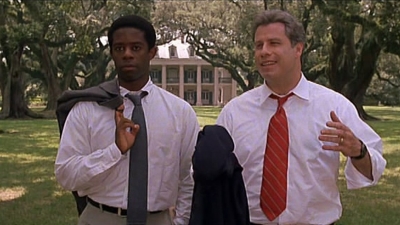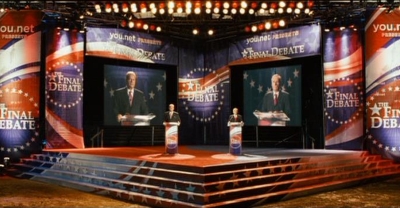

Like The Great Gatsby and The Shawshank Redemption, Primary Colors splits the protagonist and main character into two separate roles. Here the protagonist is the Clintonian southern governor Jack Stanton (John Travolta), but his story is told through the eyes of his reluctant Stephanopoulos-like campaign manager Henry Burton (Adrian Lester), the film’s idealistic main character. Jack’s primary concern is to win the election, which is the story’s external goal. Henry, on the other hand, is the one who goes on a journey related to the film’s thematic goal: to find out whether idealism is worth preserving at the cost of moral sacrifice. While Henry has an active role in the campaign, he is a passive narrator in regards to the plot, leaving Jack to be an impact character who changes those around him, including Henry and the audience. Going on the journey with Henry instead of the womanizing candidate allows us to better understand why we might root for this unsympathetic protagonist.

The candidates, Texas governor George W. Bush and Vice President Al Gore, are shown only from behind, and in only a few scenes, since the story really belongs to the Gore campaign’s General Counsel Ron Klain (Kevin Spacey), who led the fight on the ground in Florida. The script bounces back and forth between the hero’s strategy sessions and those of his adversary, Bush Sr.’s former Secretary of State James Baker (Tom Wilkinson), giving both sides equal weight; Klain comes off as the protagonist because his prior ousting from Gore’s good graces gives him a personal arc and the other team’s lead in the initial counts paint Klain as the underdog. Events unfold in the manner of a thriller, with a roller-coaster of triumphs followed by setbacks, again and again. This gives us the sense of two warring sides even though the opponents never meet face-to-face until they shake hands and walk away in the film’s dénouement. Also worthy of study is the way Strong condenses and distills 36 days worth of convoluted legal maneuvering, esoteric technical details, and the philosophical nuance of legality versus fairness, into a two hour movie that dramatizes the whole mess while at the same time making it entertaining and easily digestible.

Bud Johnson (Kevin Costner) is the clear protagonist in that he goes on a journey that transforms him from apathetic citizen to someone who learns to take his civic responsibilities seriously. However, the main story goal, to get him to vote (and to get him to vote for a specific candidate), belongs to three other characters: his daughter Molly (Madeline Carroll), who drives the story, and the two candidates -- the conservative incumbent (Kelsey Grammer) and the liberal outsider (Dennis Hopper). The candidates, along with their respective campaign managers, traverse a parallel arc, each tailoring his campaign to one single voter by comically flip-flopping, each eventually rediscovering his own moral center. The script deftly weaves Bud’s A-story and the candidates’ B-stories with two C-stories involving a local reporter hoping to graduate to the national stage while striving to maintain her integrity (echoing the theme of the candidates’ arcs), and a surprisingly dark revelation about Molly’s absent mother that makes the young girl finally appreciate her father, dysfunctional though their relationship may be. Added to all that is the barest hint of a pair of love interests for the two lead characters, yet the movie never feels overstuffed, nor the narrative structure muddled. Every character earns the redemption they find in the Capra-esque ending that argues for sane, issues-based political deliberation over this year’s focus on deleted emails, election rigging, and small-handed pussy-grabbing.

Like Primary Colors, The Ides of March follows a whiz-kid campaign manager, Stephen Meyers (Ryan Gosling), on a quest to get a Democratic governor, Mike Morris (Clooney), his party’s nomination for president. Also as in the earlier film, there is a sex scandal and a death in the third act, and both movies deal thematically with the necessity for politics to corrupt the soul. However, March is a much darker story and does not split the protagonist and main character; it’s not the story of how Morris gets the nomination (he doesn’t even appear on stage in the original play). Instead, we follow Stephen on his active path to destruction and the film is entirely about testing how far he will go to win.

GAME CHANGE (2012), another HBO film, reunites the Recount writer-director team of Danny Strong and Jay Roach. While the source book by journalistsJohn Heilemann and Mark Halperin, compiled primarily from unsourced “deep background” reporting, encompassed the 2008 campaign cycle in its entirety, the election of the nation’s first African-American president is barely a footnote -- Obama is only seen in archival footage -- in the adaptation that focuses entirely on the game-changing selection of Alaska governor Sarah Palin (Julianne Moore) as the Republican nominee for Vice President. Strong and Roach each won an Emmy for their work on the movie, which also took home three Golden Globe awards and three other Emmys.
The film opens and closes with a framing device: Political strategist Steve Schmidt (Woody Harrelson) looks back on his role in the 2008 Republican campaign and wonders whether he would push for putting Palin on the GOP ticket if he had to do it all over again. Like the other movies on this list, our guide is not one of the candidates, but a powerful behind-the-scenes character. Schmidt’s arc charts his intermittent successes in taming the shrew along with his growing frustrations as he loses control of the monster he’s created. The first act also sets up the real candidate, “maverick” senator John McCain (Ed Harris), as the underdog (he’s way behind in the polls) who, again like the idealists in the movies mentioned above, doesn’t want to play dirty or compromise his principles. By the third act, he will give in to temptation and follow a dark path, only to have to be reminded of what he really stands for. But the central character is Palin herself, a naïf thrust into the story so gung ho to win the White House that she ultimately forgets her fight is supposed to be for someone else’s benefit. One of the unique challenges of the script is to recreate a character and events that were heavily parodied in pop culture only a few years before. Palin’s greatest quips and gaffes pop up as touchstones more to remind us where they fell in the timeline than for just having fun reenacting them; the main storyline is first and foremost concerned with telling the backstage goings-on to help us better decipher the meaning of what we were collectively experiencing at the time. The drama is also not without a few eerie predictions on where the “reality show” nature of Palin’s popularity would lead us in 2016.
